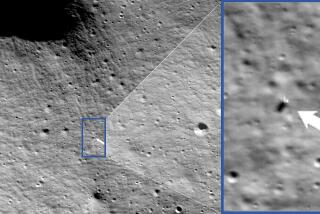Armstrong: a never-read eulogy recalls danger of his feat
Two days before Neil Armstrong first walked on the moon, speechwriter William Safire sent 12 sentences to President Nixon’s chief of staff.
The title of his memo: “In the event of moon disaster.”
Getting the astronauts to the moon was one thing, Nixon had been told. Getting them home was quite another.
“The most dangerous part of the moon mission was to get that lunar module back up into orbit of the moon and join the command ship,” Safire told Tim Russert in 1999 on an episode of “Meet the Press,” just after the memo was released. “If they couldn’t, and there was a good risk that they couldn’t, then they would have to be abandoned on the moon – left to die there.”
PHOTOS: Neil Armstrong | 1930-2012
Had Armstrong and Buzz Aldrin been stranded on the moon, left to choose between starvation or suicide, Nixon would have given the following address.
“Fate has ordained that the men who went to the moon to explore in peace will stay on the moon to rest in peace.
These brave men, Neil Armstrong and Edwin Aldrin, know that there is no hope for their recovery. But they also know that there is hope for mankind in their sacrifice.
These two men are laying down their lives in mankind’s most noble goal: the search for truth and understanding.
They will be mourned by their families and friends; they will be mourned by their nation; they will be mourned by the people of the world; they will be mourned by a Mother Earth that dared send two of her sons into the unknown.
In their exploration, they stirred the people of the world to feel as one; in their sacrifice, they bind more tightly the brotherhood of man.
In ancient days, men looked at stars and saw their heroes in the constellations. In modern times, we do much the same, but our heroes are epic men of flesh and blood.
Others will follow, and surely find their way home. Man’s search will not be denied. But these men were the first, and they will remain the foremost in our hearts.
For every human being who looks up at the moon in the nights to come will know that there is some corner of another world that is forever mankind.”
Those words by Safire never had to be spoken.
Armstrong, 82, died Saturday a national hero, just after the 43rd anniversary of his footstep that changed history.
Along with the flag Armstrong and Aldrin planted on the moon, they left a plaque. It is inscribed with other words that Safire wrote:
“Here men from the planet Earth first set foot on the moon. July 1969 A.D. We came in peace for all mankind.”
RELATED:
Photos: Neil Armstrong | 1930-2012
Neil Armstrong: His Ohio hometown mourns local legend
Neil Armstrong remembered nationwide as a hero for mankind
More to Read
Start your day right
Sign up for Essential California for news, features and recommendations from the L.A. Times and beyond in your inbox six days a week.
You may occasionally receive promotional content from the Los Angeles Times.







